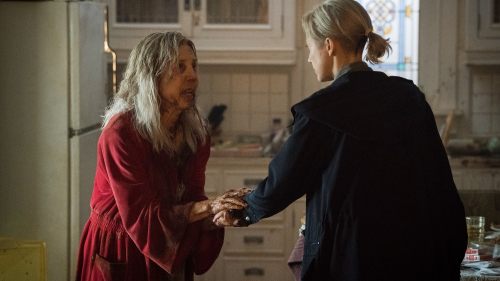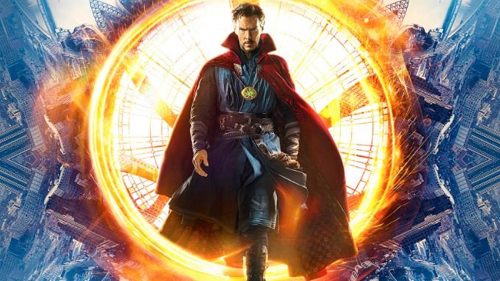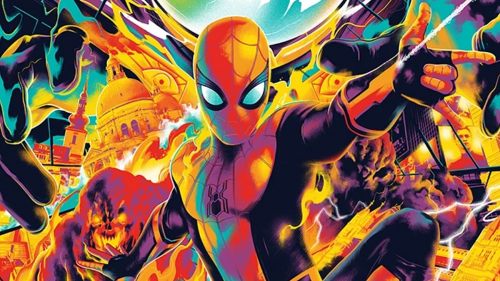SPIDER-MAN: The Only Film To Take Down The Jedi
It's sort of a rule that a Star Wars film would be the top grossing movie of whatever year it was released. Hell, some studios were so scared of The Phantom Menace in 1999 that they didn't even bother offering a big spectacle film of their own, as they knew they'd get beaten. One such studio was Sony: they really only had two major movies that entire summer, one being Big Daddy (not exactly Star Wars competition) and the other was the R-rated Universal Soldier: The Return, which wasn't released until August - long after Phantom Menace had cleared most of its 430m tally (they also had two low budget thrillers, Thirteenth Floor and Arlington Road - neither of which posed a threat to anything). So it's kind of amusing that Sony would be the first and last (for now*) studio to break that rule: to date, all but one of the six Star Wars films were the top grossing for the year (domestic), with 2002's Attack of the Clones being the only exception - and it had to cede to the guy who made Evil Dead.
While they seem quaint now, in 2002 Spider-Man's box office records were astounding. First movie to earn 100m in its opening weekend. Highest grossing single day of all time. Highest grossing 2nd and 3rd weekends of all time. And, unsurprisingly, it outgrossed all previous Raimi movies in a few hours of release. Even when Star Wars opened on Spidey's third week of release, the webslinger still grossed a whopping 45m in the face of its vaunted competition. They were box office roommates for the majority of the next few weeks, but as Spider-Man topped 400m when Clones was still inching its way to 300m, it was obvious that it would never catch up, and for the first time ever, a Star Wars film would have to settle for 2nd place (actually 3rd, as LOTR: The Two Towers also surpassed it).
It's not hard to see why it was the blockbuster of choice; even if Clones wasn't following up the not-beloved Phantom Menace, it would still be treading into darker territory, while Spider-Man probably could have gotten a flat PG instead of the PG-13 (for "stylized violence and action") if not for a few scary Green Goblin moments. That, coupled with the fact that Spider-Man was one of the most popular comic characters of all time, finally appearing in his first movie, made it an easy sell to parents AND fans (it probably got a few bucks out of horror fans looking to see what a $140 million budgeted Sam Raimi movie was like). Goblin doesn't even have much of an evil plan - he vaporizes the guys who fire him from Oscorp, and then seemingly just wants to get back at Spider-Man - easy enough for kids to understand, and not particularly scary either, as innocent lives are rarely in jeopardy as a result of their battles (there's a busload of kids during the finale, but come on - even a toddler could tell you that they'd be OK). Unlike later comic films, the themes aren't particularly weighty - no one ever debated the reasons why someone called themselves a "monster" in this film. If anything, it's so on the nose that it's almost corny; when Harry blames Spider-Man for his father's death at the end, Raimi might as well have just inserted the speech balloon above him, with "Spider-Man" in boldface to match the overblown emphasis. Without any major parental concerns, it was easily the kind of movie a summer vacationing tyke could convince his parents to see again and again, unlike Clones with its "Boba Fett sees his dad beheaded" and "Anakin massacres a camp" stuff.
It was also the next step in an evolution of comic book films, particularly the Marvel ones (keep in mind this is long before the idea of the MCU). With Batman temporarily on ice and Superman's return even further away, Marvel had the market cornered for major adaptations, and they wisely started with Blade four summers previous, testing the waters with a lesser-known character whose comic book origins could be downplayed if deemed a handicap for its potential box office fortunes. When that film was a success, Marvel went bigger with X-Men, a far more popular title than Blade and with the bonus of offering a full roster of colorful heroes for people to enjoy (and action figures to buy). When that scored huge (4th highest grossing film of that summer, 8th overall for 2000), it was clear that audiences were ready for this particular brand of entertainment again, and that Marvel's properties wouldn't be prone to their disastrous early 90s efforts (most of which were barely even released). And so after many false starts, with everyone from Albert Pyun to James Cameron once signed on to bring Spidey to the big screen, everything finally came together. The goodwill earned from Blade and X-Men coupled with the immense popularity of Spider-Man as a character gave them a license to print money, and that's pretty much exactly what it did - until Shrek 2 nudged it out a couple years later it was actually the 5th highest grossing film of all time, a mark I doubt anyone thought it would hit, especially when it had to contend with the Jedi.
And the funny thing is is that it's really not that great of a movie. While it mixed and matched elements from the standard Amazing Spider-Man run and the more current "Ultimates" version (mainly dropping Gwen Stacy in favor of introducing Mary Jane Watson as THE girl for Spidey's origin), it was still kind of blandly following the story we'd heard a million times, with little invention of its own (beyond the Goblin's horrendous costume). David Koepp's script worked in so many supporting characters from the comics that they barely have time for a proper introduction; Betty Brant (Elizabeth Banks!) isn't even identified with her first name, and when there's no time for an actual screen appearance, they just mention them (Dr Connors and Eddie Brock get shout outs, neither would appear until the sequels). It also races through everything; Harry and Peter graduate high school and move in together, and Harry starts seeing MJ... and that description is about as lengthy and specific as it appears in the film itself. When Peter says he was fired from his job, you wouldn't be alone in wondering WHAT job, since we never saw him there. Maybe the first cut was 5 hours long or something (the DVD offers no deleted scenes), or maybe they just felt like they had to mention every single thing of note that happened in the first 122 issues of Amazing Spider-Man (and Amazing Fantasy #15, obviously), from origin up until the Goblin's "death".
Don't get me wrong, it's a decent movie. Cliff Robertson is about as perfect of an Uncle Ben as we could hope for (ditto for a then relatively unknown JK Simmons as JJJ), and while they use spotty CGI for far too much of the web-slinging action (in some sequences it's almost jarring when they cut to a rare shot of a physical, non-digital Spidey), Raimi and his team really nailed the physicality and ballet-like prowess that has been one of the character's greatest strengths for the past 40 years. The organic web shooters doesn't bother me (it was a James Cameron idea, supposedly), and revisiting the film now it's almost charming in its simplicity, with no one attempting to destroy New York (which would have been disastrous timing, nine months after 9/11, which resulted in the loss of its original, terrific teaser trailer) and Goblin acting alone instead of roping in 2-3 other super villains. There are also a couple of oddball touches I quite enjoy, like the seemingly psychotic science teacher that brings them to the lab where Parker gets bitten (seriously, watch the guy - he comes off like he's one second away from snapping everyone's neck), and Goblin inexplicably wandering around a house fire dressed as an old woman for no other reason than to lure Spider-Man in for a quick followup to his insane offer to join forces.
And Bruce Campbell makes a cameo. I don't care about this at all, but if I don't mention it someone in the comments will complain, so there it is.
So yeah, it's got its high points and is a perfectly entertaining film, but overall it's hardly the best comic book film ever made. Luckily, Raimi and the cast would return and get it perfectly right with 2004's Spider-Man 2, which IS one of the best, only to stumble a bit again with Spider-Man 3 in 2007 (they didn't screw it up as badly as its reputation suggests, but I'm sure some folks will argue using their spotty 8 year old memories as defense). Ironically, the best of the three movies was the only one that DIDN'T top the box office chart for its release year - Shrek 2 forced Spidey to take the silver in 2004, though he came out on top again with the polarizing 3rd movie (albeit with the series' lowest gross yet), even getting revenge in the process, coming out about 14 million ahead of the same year's Shrek The Third. As for George Lucas, he never had to face our friendly neighborhood Spider-Man again, though that will change soon. The two box office titans will be in direct competition again in 2017, when the currently untitled entry (starring the new Spider-Man, who makes his debut in next year's Civil War) will hit theaters two months after Episode VIII. Looks like Sony/Marvel isn't confident enough to pick a direct fight with the galaxy far far away, but with the MCU on his side (and Episode VIII being the followup to a movie that no one's seen yet and could possibly be a disaster) I think Spidey has a chance to do the impossible once again, now that he's in the right hands again. If he can come back from Maximum Clonage, he can do anything, far as I'm concerned.
*Force Awakens has to clear Furious 7, Avengers 2, and whatever else might come blow away box office records before December. I'm sure it'll outgross Furious 7, but with Avengers looking to top out at 450m or so, Awakens will have to fight to get there - not to mention be the top grossing Star Wars film ever on its first run. No pressure.



